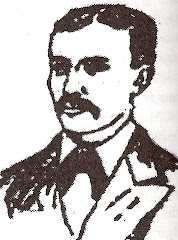Although on a conscious level a man lives for himself, he is actually being used as an unconscious instrument for the attainment of humanity's historical aims. A deed once done becomes irrevocable, and any action comes together over time with millions of actions performed by other people to create historical significance. The higher a man stands on the social scale, the more contact he has with other men and the greater his impact on them, the more obvious are the inevitability and the element of predestination involved in everything he does.1
1Leo Tolstoy
Tuesday, August 31, 2010
War & Peace - Volume III, Part I, Chapter I
Friday, August 6, 2010
The Innocence Project Can't Help James Titus - UPDATED
I got a letter from the Innocence Project addressed to "James Titus c/o Erik Anderson" yesterday.
Unfortunately, it says that the Innocence Project will not be able to help me unless I can find DNA evidence from the crime, which happened on April 8, 1886.
According to records, there was more DNA than one man was capable of producing inside Tillie's body. Unfortunately, I don't think that the public is going to approve exhuming Tillie's body in an attempt to find it now. I'm no expert, but I think it's safe to say that the DNA has been destroyed by natural decay over the years.
That's the update for today.
Stay tuned! We are going to Free James Titus!
UPDATE - here's the letter:

Click Here to Read the Letter
Unfortunately, it says that the Innocence Project will not be able to help me unless I can find DNA evidence from the crime, which happened on April 8, 1886.
According to records, there was more DNA than one man was capable of producing inside Tillie's body. Unfortunately, I don't think that the public is going to approve exhuming Tillie's body in an attempt to find it now. I'm no expert, but I think it's safe to say that the DNA has been destroyed by natural decay over the years.
That's the update for today.
Stay tuned! We are going to Free James Titus!
UPDATE - here's the letter:
Click Here to Read the Letter
Monday, August 2, 2010
The Ethics of the Historian
It is true that, whether he is labeling a museum exhibit or writing a biography, the historian that lets himself be carried away by the hope that he is describing a "first", "oldest," "largest," or whatever, may be in for some embarassment. But there is nothing especially ethical about a desire to avoid embarassment; even burglars take care to avoid discovery. Embarassment is not the penalty to be feared. The historian who knowingly lets the truth be covered up or stretched out of shape may never be contradicted. His authority may be accepted in good faith. Those who doubt him may shrug their shoulders and say nothing, not wishing to upset him with inconvenient facts or arguments. The ethics of the historian are important precisely because he can so often expoect his sins to go unexposed. This is even truer of the local historian than of the professional academic. 1
1Felt, Thomas E. Researching, Writing and Publishing Local HistoryNashville: American Association of State and Local History, 1981. ISBN-0-910050-53-8
Subscribe to:
Comments (Atom)



